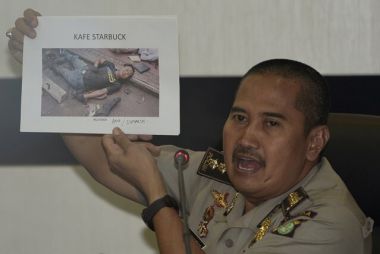ISIS shows extent of its reach with Jakarta terrorist attacks, Indonesian general says

The recent bomb and gun attack in Indonesia's capital, which was reportedly financed by an Indonesian member of the Islamic State (ISIS) in Syria, tells how far and massive the reach of the terror group has become, Indonesian police said.
At least five men attacked a Starbucks cafe and a traffic police booth with handmade bombs, guns and suicide belts on Thursday last week, killing two civilians—a Canadian and an Indonesian—and wounding 20 others in the first major attack in the country since 2009, according to reports. The militants were also killed, either by their suicide vests or by police gunfire.
ISIS later claimed responsibility for the attack on Twitter late Thursday.
"Thursday's attack was funded by ISIS through Bahrun Naim, an Indonesia who spent one year in jail for illegal possession of weapons in 2011, and is now in Syria fighting for the ISIS," Gen. Badrodin Haiti, national police chief said, as quoted by the Associated Press.
He said one of the five attackers is known as Sunakim, who in 2010 was sentenced to seven years imprisonment for his involvement in military-style training in Aceh, but was freed early.
Haiti warned that the ISIS link in Indonesia, if proven, would post major challenge to Indonesia's security forces. The country had been known to be an ISIS sympathiser but with no active cells capable of planning and carrying out a plot until Thursday's terrorist attack, AP said.
Maj. Gen. Anton Charliyan, national police spokesman, said police found an ISIS flag in the home of one of the attackers after raids were conducted in Java, Kalimantan and Sulawesi. Four arrests were made.
He later clarified that the three men who were arrested at dawn in their homes in Depok on the outskirts of Jakarta are no longer suspected of being linked to the attack.
On Friday evening, he said police searched the home of another of the dead bombers whom they identified as Muhammad Ali.
A suspected militant was also killed in a gunbattle in central Sulawesi, the alleged hideout of Indonesia's most wanted Islamic radical, Abu Wardah Santoso, who leads the East Indonesia Mujahidin network. While not linked to Thursday's assault, the group has reportedly pledged allegiance to ISIS, AP said.
ISIS has seized large swathes of land in Syria and Iraq since 2013. It aims to create an Islamic caliphate, which apparently has attracted some 30,000 foreign fighters from around the world, including a few hundred Indonesians and Malaysians.
Experts say the supporters of the terror group in Indonesia are drawn from the remnants of Jemaah Islamiyah (JI), which was responsible for several attacks in the past.
Meanwhile in a show of sympathy and solidarity for the victims of Thursday's attack, about 200 young people earlier gathered in front of the Starbucks, carrying posters that read "We are not afraid,'' Fox News reported.
A large LCD screen atop the building containing the Starbucks also displayed messages saying, "(hash)prayforjakarta" and "Indonesia Unite," it added.











